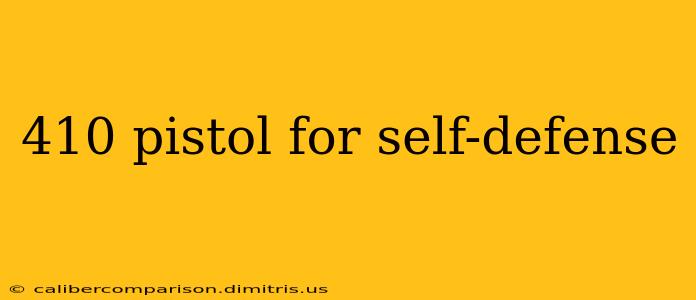Choosing a firearm for self-defense is a deeply personal decision, requiring careful consideration of various factors. The .410 bore pistol, while less common than other calibers, presents a unique set of advantages and disadvantages worth exploring. This guide delves into the nuances of using a .410 pistol for self-defense, helping you make an informed choice.
Understanding the .410 Bore
The .410 bore is a shotgun gauge, meaning it's defined by the number of lead balls of a specific diameter that would weigh one pound. It's significantly smaller than gauges like 12 or 20, leading to a smaller diameter projectile. This translates to several key characteristics:
- Smaller Recoil: Generally speaking, .410 pistols offer less recoil than larger caliber handguns, making them potentially easier to handle, especially for smaller individuals or those new to firearms.
- Ammunition Variety: .410 pistols can fire various ammunition types, including shotshells (containing multiple pellets) and slugs (single projectiles). This versatility offers options for different self-defense scenarios. However, ammunition availability might be less extensive compared to more popular calibers.
- Reduced Penetration: While the smaller projectile size can lead to less overpenetration compared to larger calibers, this also means reduced stopping power. Effective self-defense requires precise shot placement.
Advantages of a .410 Pistol for Self-Defense
- Compact and Concealable: Many .410 pistols are designed for easy concealment, making them a potential option for individuals who prioritize discretion.
- Less Recoil for Easier Handling: As mentioned earlier, reduced recoil can benefit users with less upper body strength or those seeking a less-intimidating shooting experience during training.
- Potential for Multiple Targets: Shotshells offer the possibility of engaging multiple threats simultaneously.
Disadvantages of a .410 Pistol for Self-Defense
- Lower Stopping Power: Compared to larger calibers like 9mm or .45 ACP, the .410 bore generally offers lower stopping power, meaning it may require more precise shot placement to effectively neutralize a threat.
- Limited Ammunition Capacity: .410 pistols often have smaller magazine capacities compared to other handguns.
- Accuracy Challenges: The smaller projectile and potential for shot spread can make accurate shots at longer ranges more challenging.
- Availability of Ammunition: Finding a consistent supply of .410 ammunition, especially specific self-defense rounds like slugs, might be difficult compared to more popular calibers.
Choosing the Right .410 Pistol
If, after weighing the pros and cons, you're considering a .410 pistol for self-defense, selecting the right model is paramount. Factors to consider include:
- Reliability: Opt for a pistol known for its reliable performance. Read reviews and seek recommendations from experienced shooters.
- Ergonomics: The pistol should fit comfortably in your hand and allow for a proper grip.
- Sights: Clear and accurate sights are essential for precise shot placement.
- Safety Features: Prioritize models with robust safety mechanisms.
Alternatives to Consider
Before settling on a .410 pistol, exploring alternatives is crucial. Handguns chambered in 9mm, .40 S&W, or .45 ACP generally offer greater stopping power and wider ammunition availability. However, these calibers typically have more significant recoil. Ultimately, the best choice depends on your individual needs, physical capabilities, and comfort level.
Conclusion
The .410 pistol presents a niche option for self-defense. While offering advantages like reduced recoil and compact size, it comes with trade-offs in stopping power and ammunition capacity. Thorough research, practical experience (through proper training), and careful consideration of alternatives are crucial before making this decision. Always prioritize responsible gun ownership, including proper training, safe storage, and adherence to all applicable laws and regulations. Consult with firearms experts and undergo professional training before carrying any firearm for self-defense.

